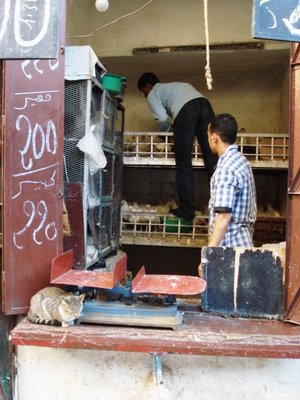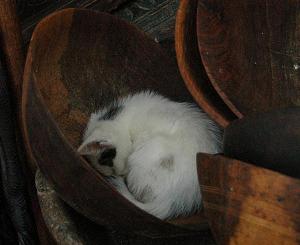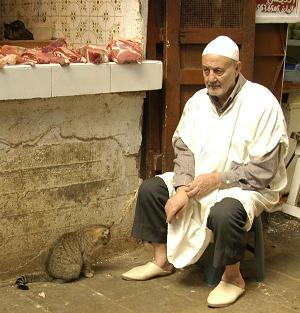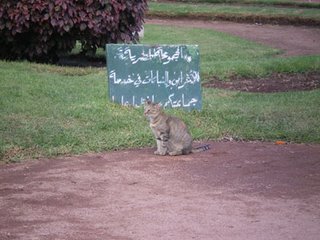Cats are abundant in Morocco. Overabundant, even. One of my favorite things about living there was photographing the street cats – of which there would often be groups of up to 20. Judging by the spate of posts from the Moroccan blogoma (and even some recent travelers to Morocco) about cats, I'm not the only one who loves felines – and lately, even professional artists and photographers have found them to be a popular subject!
The House in Marrakesh recently shared a series of photos of Moroccan street cats. Here's one, of which the blogger said:
In the medina, it is useful to live above a fish shop.
Useful indeed, as the blogger mentions in her next post that Morocco is experiencing a shortage of cat food:
Most Moroccans feed their cats scraps and they seem to do fine. Our pampered beasts have acquired a taste for Whiskas but the supply seems to have run out.
It is not to be had anywhere. Not at Marjane or Acima ( the supermarkets outside the medina). People are emailing and telephoning each other in search of Whiskas sightings. Things often run out here – mustard, for example, and no one is quite sure when they will reappear.
Global Voices’ own Lalla Lydia shared artist photos of Moroccan cats, while sharing this tidbit about the Moroccan attitude toward felines:
Household animals, particularly dogs, are considered taboo in Islam because they are said to be unclean. The saluki (a pure-bred hunting dog from Arabia) is exempt from this, as are songbirds and cats (perhaps because the latter keeps out the rodents). Supposedly it is also because cats are supposed to be clean (just think of how long they spend licking themselves).
In response, a reader of her blog sent a Moroccan cat calendar. Here's Miss September:
(Photo and calendar by Joan)
The Whole Kitten Kaboodle (whose name is a total coincidence in relation to the title of this post) recently visited Morocco and had many lovely cat photos to share. Here's one, with the blogger's own caption:

Guess what!!! In Morocco, chickens are kept behind bars in prison boxes. And these prison boxes are guarded by specially trained felines. I present to you the Sargeant at Arms of the Poultry Police.
Another traveler, author of TMF's Travelogue, had kind things to say about the Moroccan treatment of cats, and shared a couple of photos as well:
Cats are everywhere in Morocco – Moroccans are indeed cat people. People don’t really “own” cats the way they do in developed countries – they’re more like community pets that wander about. People take care of them and feed them scraps when they can. Some are pampered more than others – like there was one cat that seemed to live in the hotel in Essaouira, who just forced his way in and made himself at home on the sofa – jumping up and taking hold of his spot as though it had a reserved sign on it. There was also a few in the restaurants that did the same. The ones that aren’t as fortunate are a bit mangy and will often congregate at your feet, screaming loudly for scraps. This is always a bit sad, and I’m a cat person, so I always end up feeding them – which is then followed by a half dozen more following.


Wayfarer Scientista used cats to determine if a place was worth staying in:

A cat & an Arabic sign. We found that the relative health of the cats were a pretty good indicator of whether or not we wanted to stick around in any one place.
Finally, DeepTape sums up the cat situation best, saying:
Cats are everywhere in Morocco, on rooftops, fighting on the tent fabric overhead, strolling through restaurants. In the Palais Bahia, we saw a dozen cats gathered together in the courtyard; clearly they were the true rulers of the place. On a rooftop terrace restaurant, a cat padded over across neighboring roofs to make friends and beg for scraps. However, I saw no rats, something I can’t say for San Francisco.
To this I will add a personal note – Moroccan cats are simply the best. So good, in fact, that I brought one back to the United States with me. On that note, I leave you with a photo of my very own Moroccan cat, LC:







17 comments
This is completely at odds with what I saw of the cats in the cities of Marrakech and Agadir.
Other than a few exceptions, cats were emaciated and sickly. Outside a pharmacy we saw one poorly cat who had either cat flu or something similar, his nose was thick with mucus and the skin was scabby with what looked like an extreme flea allergy, he looked desperately unwell. Not far from there we saw a whisper of a kitten, one eye infected, swollen with pus, it struggled along even after a man stepped on her as she made her way to her mother. What would you do if you had stepped on a poorly animal? Would you walk on? He did.
Generally I feel the Moroccan people couldn’t give a damn about the animals.
If that’s what you saw in Marrakesh and Agadir, why would you make an assumption about the whole of Moroccan people?
No, I’m making it up . . .
Cats live among the Moroccan people in the same way pigeons do, it’s despite the human neglect, cats have a funny way of making their homes where they’re not wanted.
It’s a country where most people live in poverty, they lack basic sanitation and education appears to be little better than Victorian England. The charity’s that do work there, SPANA, etc. are supported largely by foreign money. And if women are expected to play second class citizen, then what of the lowly (dirty) cats!?
I didn’t say you were making it up, but you’ve spent time in what, two cities in Morocco and you’re judging the whole of the Moroccan people?
First of all, the Moroccan education system in much of the country is actually quite good, and based on the French system. Second, basic sanitation is not lacking in urban areas, and is making headway in more rural ones. Third, you are right about the charities, but not about women playing second class citizens! How much time have you really spent there? Do you know anything about the culture?
I agree that Moroccans generally do not treat cats (and other animals) very well, to be honest with you, but when poverty is an issue, do you really expect them to worry about cats?! Do we worry about squirrels in the west? What makes cats so different, your expectation that they be domestic animals based on your western world view?
That’s a wonderful insight on Kitten Kaboodle’s part; as for the raging debate between Chris and Jill, you are both right and your experiences are equally valid, at least in so far as the cats are concerned. And you both are pretty much making the same case about poverty and animal treatment. However, I find Chris’s comments about women and education both demeaning and ill-informed. I can only assume that this was based on your personal experience, which is, again, valid. However, Moroccan women, and I’m not talking a minority here, are most at least functionally bilingual, even multilingual, and hold positions in the police force (granted only as traffic cops, but that’s a start), education, politics, health, and the arts. And I’m not sure where this “second class citizen” comes from; certainly women are mistreated but hardly worse than many are treated in the U.S. (I won’t bring certain other Western countries into this because I think they may be more advanced in their treatment of women’s equality than the US.) This does not erase the prevalent poverty and high illiteracy that remains, particularly among older and rural generations. However, these are not directly related to treatment of animals. The Prophet was an illiterate, but by all regards, intelligent man, and there are many hadith of him preaching kind treatment of animals. Also, poor treatment of animals is not something only developing countries have. Let us remember the mass abandonment of beloved French dogs in the summer vacation months, and that up until recently cats, perceived as vermin, were drowned in sacks in the canals of Venice…Inversely, I’m told by friends who’ve lived in Egypt and Turkey that there cats are extremely well regarded and treated (though still probably disease-ridden and hungry, but then, so are many people). Is it wise to extrapolate one experience of a country to speak of the whole? Sometimes we must, but in this case, I think we should watch where we tread…Nevertheless, great comments, all!
Thanks for sharing this very interesting post. I am a cat lover and I enjoy reading articles like this. You certainly seem to have had a wonderful experience in morocco. I think you are quite lucky that you were able to take that very precious gorgeous little cat home with you and he surely is blessed that he was taken to a loving home. I hope and wish you both good health and well-being.
Btw, since this is a 5 y/o article, I forgot to ask if you could share an update on your beautiful Moroccan cat? Anyway, I hope he is happy and doing well. Thanks.